Community website by MBC/Ernest Abrams. Call 808-739-9797 for advertising/sponsorship.
First Friday Hawaii
News Item- Powered by MBC NewsMaker
Hawai i State Art Museum - EXHIBIT - "In Hawaiʻi"
- Tweet
“In Hawai‘I” exhibit, at the Hawaii State Art Museum in downtown Honolulu
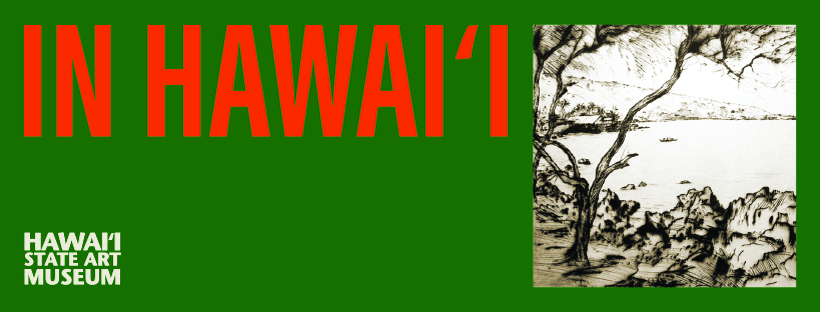
WHERE – Hawaiʻi State Art Museum, second floor of the No.1 Capitol District Building, 250 South Hotel St., Honolulu HI 96813
EXHIBIT DATES: September 6, 2019 – closing date to be determined (exhibit will be up for at least 1 year)
In Hawaiʻi art exhibit opens at the Hawaiʻi State Art Museum in downtown Honolulu.
Featuring artworks from the Art in Public Places Collection of the State Foundation on Culture and the Arts, this exhibition reflects the rich diversity of creative vision found in Hawai‘i, exploring themes of influence, innovation, inspiration, insight and inquiry.
Inspiration from the natural and built environment,
Influence from modernist era artists, foundational contributors to the Art in Public Places Collection,
Insights gained from living with, understanding and assimilating root culture values,
Innovation evidenced in artworks exemplifying inventive, new approaches to artmaking through the decades, and
Inquiry-inspiring narrative artworks drawing us into thinking, exchanging ideas and learning about ourselves and each other through “talk story.”
Artwork mediums in the exhibit include painting, photography, sculpture, ceramics, and glass.
For more than fifty years, the Art in Public Places Collection of the Hawaiʻi State Foundation on Culture and the Arts has been recognized as one of the most significant collections of contemporary art of Hawaiʻi.
Artists in the exhibit:
Pio Abad and Frances Wadsworth Jones, Satoru Abe, Lalepa Pi'ikoi Ah Sam, Ruthadell Anderson, Mary Babcock, Carol Bennet, Elizabeth Bennet, A. Kimberlin Blackburn, Allyn Bromley, John E. Buck, Mark A. Chai, Jean Charlot, Joey Chiarello, Lucille Cooper, Bryan Czibesz, Isami Doi, Betty Tseng Yuho Ecke, Christopher Edwards, Matthew Egan, Margaret Ezekiel, Dorothy Faison, Scott Fitzel, Juliette May Fraser, Sally French, Ka-Ning Fong, Francis Haar, Susan McGovney Hansen, Todd Herzberg, D. Howard Hitchcock, Pegge Hopper, Diana Nicholette Jeon, Anne Kanahele, Jun Kaneko, John Tanji Koga, Wayne Levin, Huc Mazelet Luquiens, Clarence Maki, Martha Marques, Marques Marzan, Mazatl, Marie McDonald, Marcia Morse, Terry Holokai Murata, Tetsuo Ochikubo, Carl Franklin Ka‘ailā‘au Pao, Margo Ray, Franco Salmoiraghi, Tadashi Sato, Shawn Spangler and Bryan Czibesz, Donna Stoner, Bruna Stude, Jonathan Swanz, Toshiko Takaezu, Reuben Tam, Madge Tennent, Harry Tsuchidana, Maika‘i Tubbs, Robert Dick Tynes, Phil Uhl, Lionel Walden, John Wisnosky, Suzanne Wolfe, Daniel Wooddell.
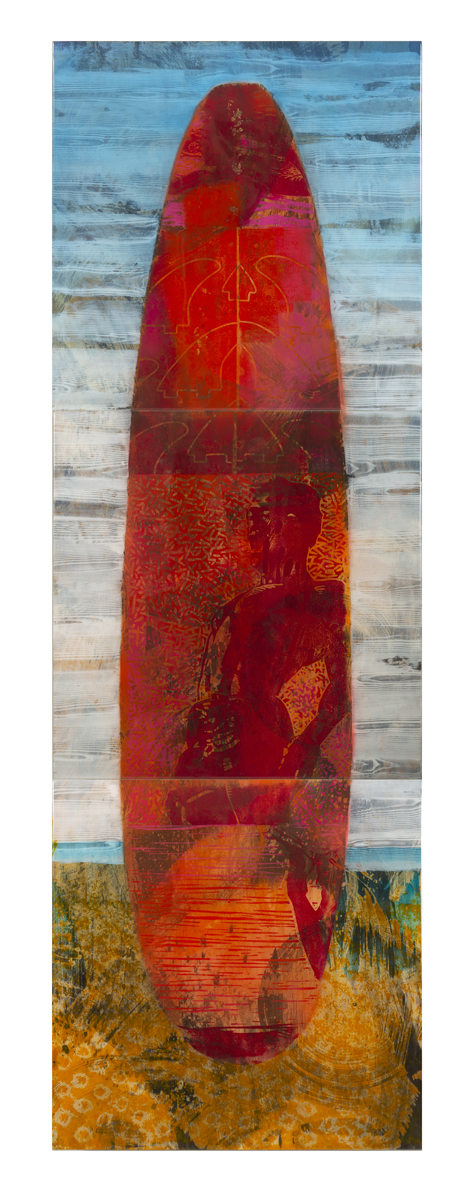
Carol Bennett
Story Stick
shellac, India ink, acrylic, resin, 2018
“If a surfboard could talk, it would have stories to tell,” says artist Carol Bennett. For her, every surf session generates a new and unique story for the surfer. She also feels that the surfboard, sometimes called a stick, has its own ongoing story, told by the marks on it. The title, Story Stick, also references tools marked by furniture makers and architectural installers to record dimensions and locations of critical elements. Bennett marked Story Stick with big calligraphic brush strokes and splattered paint, followed up with paint issued by a homemade compass swung in bold circles. The overall effect is one of action and movement, reminiscent of a surfboard in use. The final resin layer glistens like water.
Born in Los Angeles, Bennett received her BA in Painting from the Art Center College of Design in L.A. Early in her career, Bennett completed a four-year apprenticeship painting billboards, backdrops and stage sets for theaters, television, and motion pictures. She has split her time between Hawai‘i and California since 1974, living on Kaua‘i since 1990.
photo credit: Paul Hayashi
image courtesy of: State Foundation on Culture and the Arts
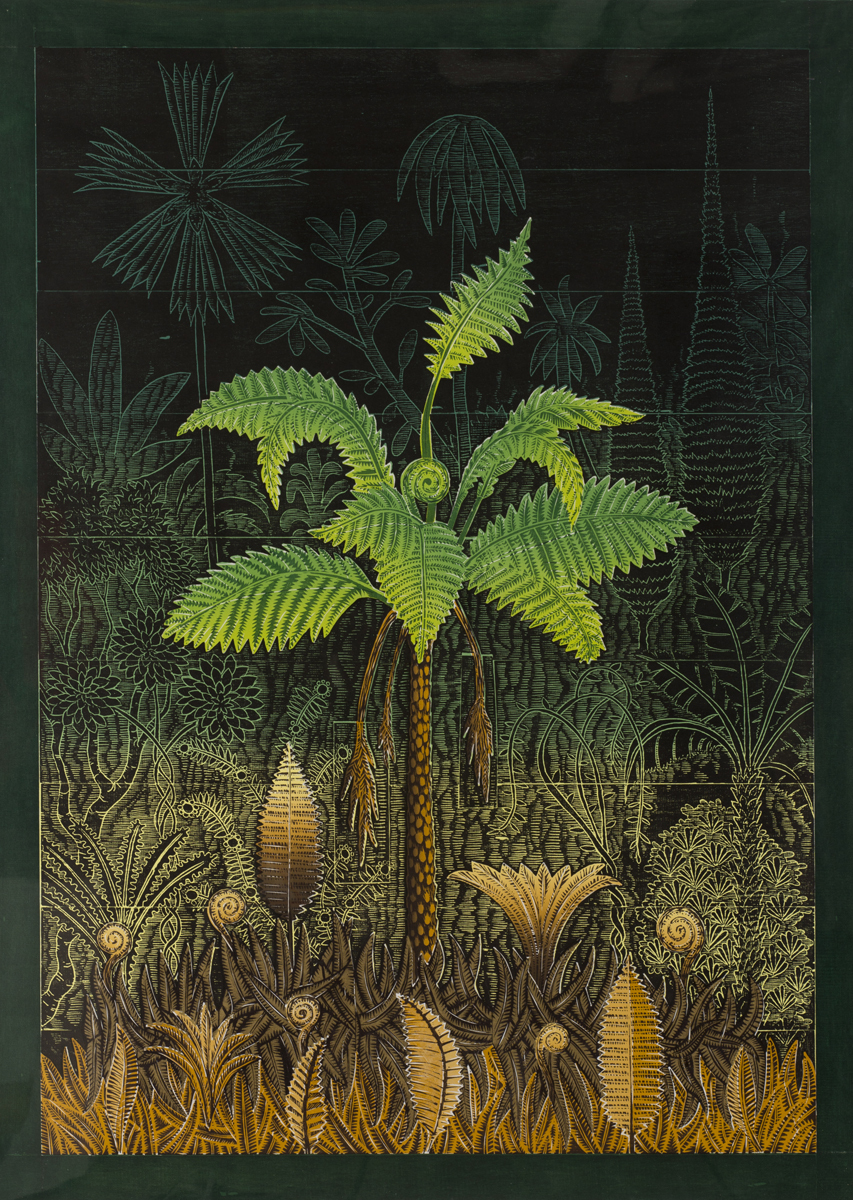
John Buck
Hapu‘u
Woodcut, 2015
John E. Buck is well known for his wood and bronze sculptures and his large wood-block prints. He is fascinated and inspired by both the cultural imagery and the nature surrounding his two homes, one in Bozeman, Montana, and the other on Hawai‘i Island. The print Hapu‘u takes its title from a large tree fern endemic to Hawai‘i that can grow up to heights of twenty-five feet or more. To create this print the artist carved over fifty separate wooden blocks. The blocks were assembled like a puzzle, with each block inked individually and printed by hand. For each print there were four printing passes, using nine different colors printed on bleached Thai Mulberry paper. John Buck created the design and did all the carving. The printer was Megan McGaffigan.
photo credit: Paul Hayashi
image courtesy of: State Foundation on Culture and the Arts
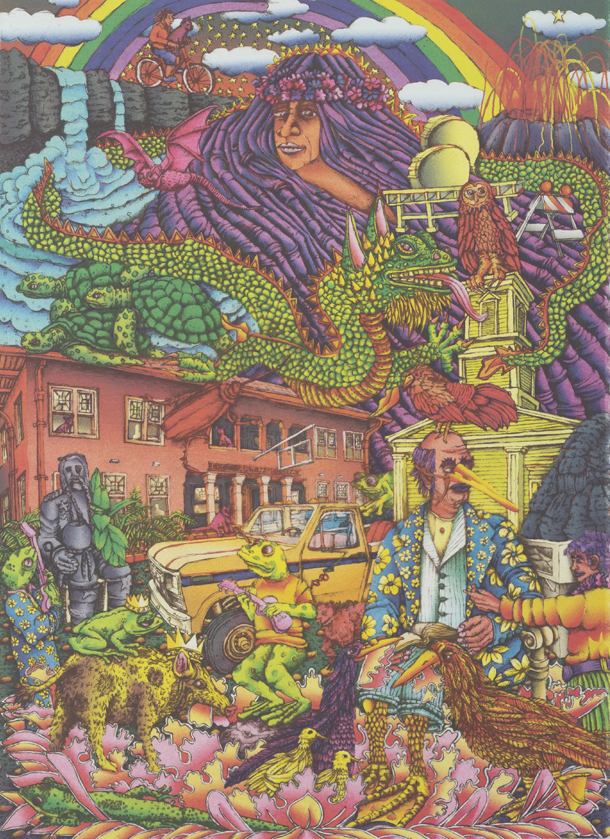
Matthew Egan
Hello Hilo, HI
Lithography, 2017
A kaleidoscope of colorful images populates Matthew Egan’s Hello Hilo, HI. Figures, flora, and fauna appear in various locations, some recognizably specific to Hilo. The composition presents a visual narrative based on the artist’s observations of the interaction between humans and the natural environment.
Matthew Egan is an Associate Professor at East Carolina University in North Carolina. He uses printmaking processes to consider social, political, and cultural metaphorical symbols.
photo credit: Paul Hayashi
image courtesy of: State Foundation on Culture and the Arts
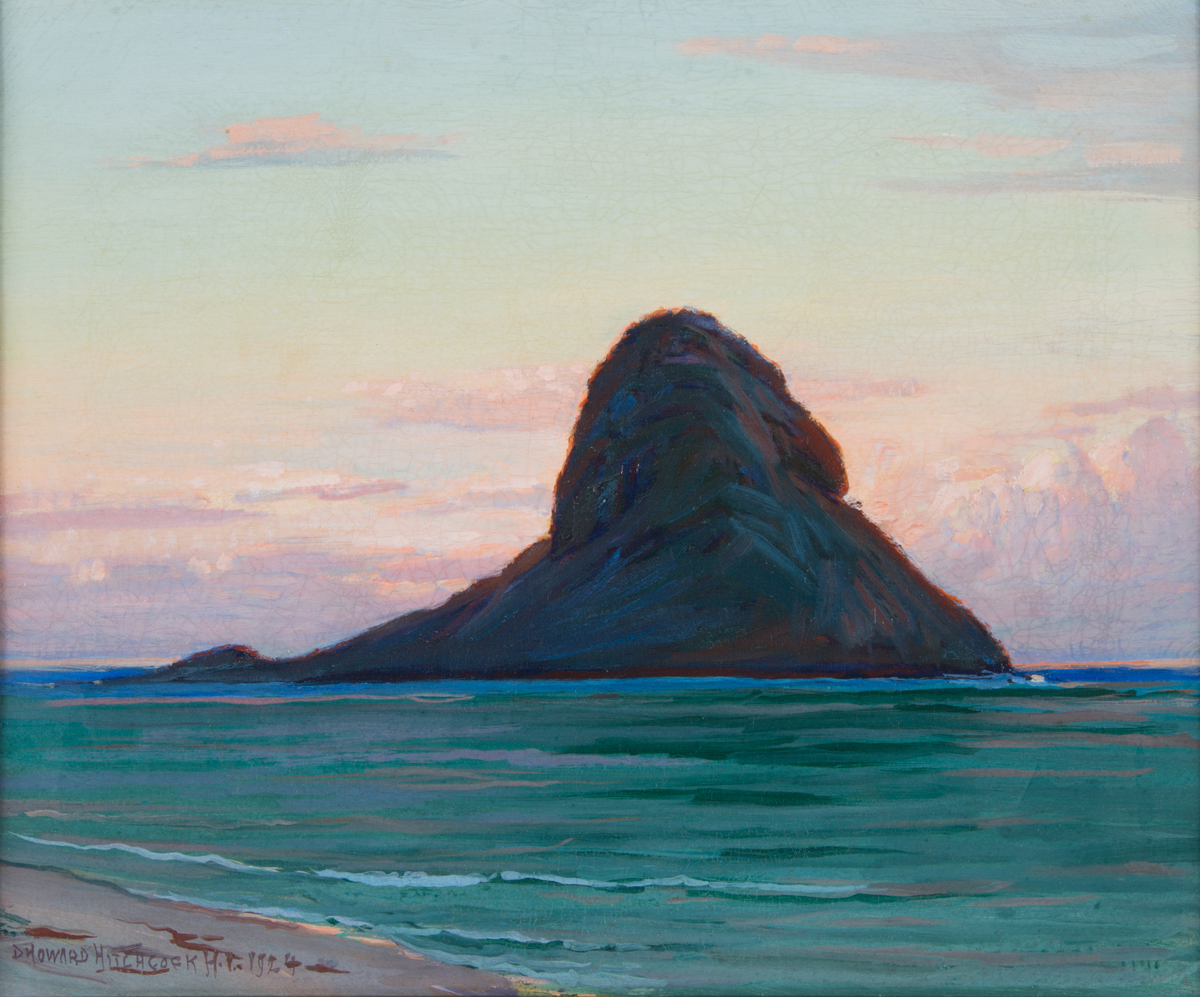
D. Howard Hitchcock
Chinaman's Hat at Twilight
oil on panel, 1925
D. Howard Hitchcock (1861 – 1943) was born in Hilo, Hawai‘i. He studied at Oberlin College in Ohio and the California School of Design in San Francisco. After returning to Hawai‘i in 1886, he became a student of French-born landscape painter Jules Tavernier. Hitchcock continued his education in Paris, training at the Julian Academy for three years. Once again returning to Hawai‘i, he immersed himself in depicting the beauty of the Hawaiian landscape. His paintings illustrate a mastery of rendering natural light falling on the sea and mountains. In Chinaman's Hat at Twilight the artist depicts Mokoli‘i, commonly referred to as Chinaman's Hat, an islet off Kualoa on the island of O‘ahu. The rocky island lies in the shade of the Ko‘olau Mountains behind the viewer, and is set off by the rising pink-tinged clouds of sunset rather than sunrise. The shallow waters of the foreground embody a dull greenish blue rather than the turquoise colors visible during the day.
image courtesy of: State Foundation on Culture and the Arts
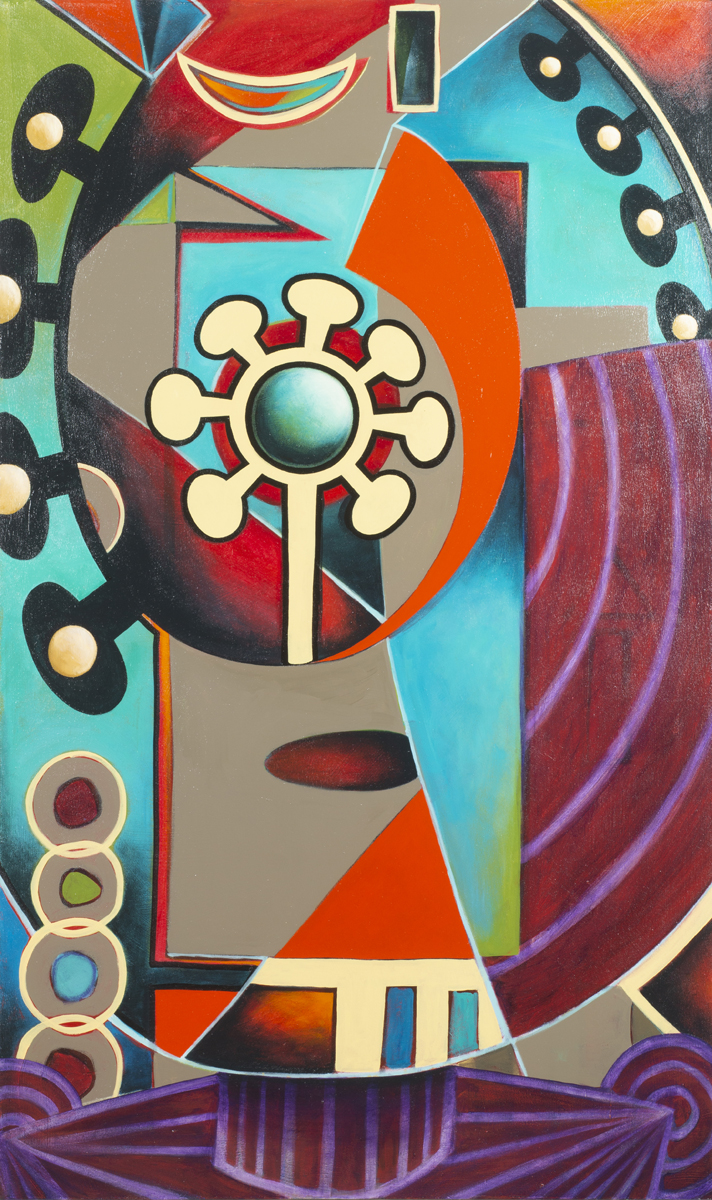
Carl Franklin Ka‘ailā‘au Pao
Ki‘i Kupuna: Loli
Acrylic and shellac on canvas
Ki‘i Kupuna: Loli draws the viewer’s eye into a composition asymmetrically balanced through careful placement and repetition of color, line, and geometric shapes. Loli‘ana, a Hawaiian word meaning "to evolve" or "to change," underscores the painting’s theme of transformation-creation through destruction. Carl F. K. Pao feels that the artistic process itself is often a natural process of creation following destruction.
Inspired through personal investigation of his Hawaiian culture, Pao explores Hawaiian spiritual and symbolic iconography misinterpreted and destroyed in the early 19th century by European missionaries. The artist works with contemporary methods and materials to create graphically powerful images that reflect both his Hawaiian and European ancestry.
photo credit: Paul Hayashi
image courtesy of: State Foundation on Culture and the Arts
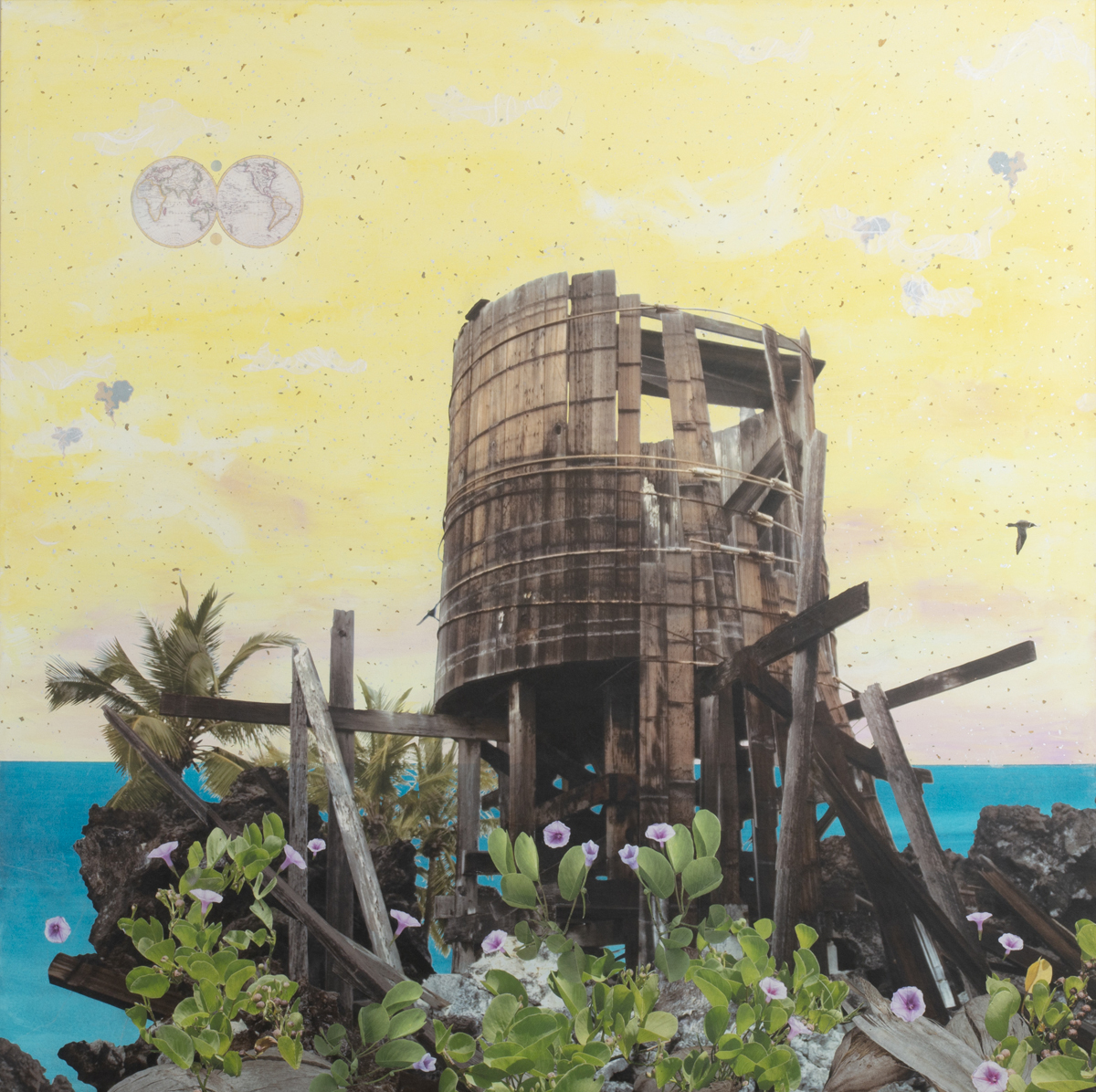
Margo Ray
Containment Landscape #21 – Makalawena
Gouache, layered paper, hand-cut inkjet prints on canvas, 2018
Seen against a surreal sky of yellow and pink, an abandoned and decaying water tank presents the focal point in a scene of abandonment, mystery, and the encroaching beauty of nature. Containment Landscape #21 – Makalawena, is part of Hawai`i Island artist Margo Ray’s ongoing body of work focusing on water tanks as the central subject. Once a common sight throughout the islands, these water tanks are now remnants of a rapidly-disappearing rural lifestyle. While unfamiliar to some, they remain a cherished symbol of older times and open spaces for others. Her series uses media collage, printmaking and installation to convey reverence for the past, reflection and a “deeply rooted critique of the contemporary ‘order of things.’”
Margo Ray earned a BA in studio art from the University of Hawai`i at Hilo, and an MFA from Concordia University in Montreal, Quebec. Her Containment Landscape series uses media collage, printmaking and installation to convey reverence for the past, reflection and a “deeply rooted critique of the contemporary ‘order of things.’
photo credit: Paul Hayashi
image courtesy of: State Foundation on Culture and the Arts
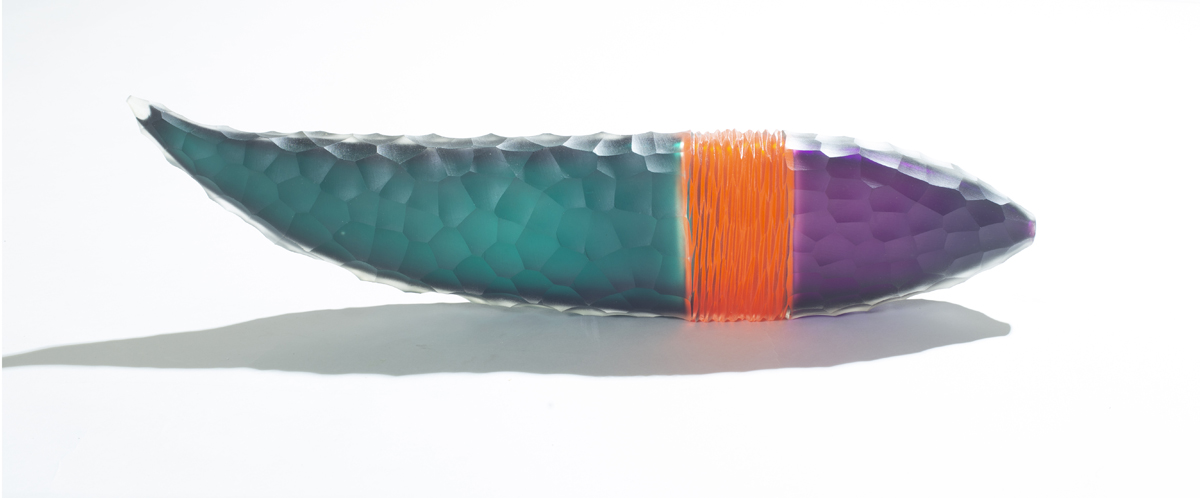
Jonathan Swanz
Saddle Wrasse
blown and carved glass, 2018
Working with glass for nearly twenty years, Jonathan Swanz creates art in a wide variety of styles, both functional and nonfunctional. This sculpture was directly inspired by the saddle wrasse, one of the most common endemic reef fish in Hawai‘i. To create the work Swanz used two Italian glass techniques, incalmo, to join together (while still hot) the three different colored sections, and buttuto, to produce the carved, textured surface.
photo credit: Paul Hayashi
image courtesy of: State Foundation on Culture and the Arts
About the Hawaiʻi State Art Museum
Created as a venue to increase public access to the Art in Public Places Collection of the Hawaiʻi State Foundation on Culture and the Arts (SFCA), the Hawaiʻi State Art Museum (HiSAM) displays artwork from the Art in Public Places Collection as well as from collaborations with the Hawaiʻi State Department of Education (DOE). HiSAM is operated as a part of the Art in Public Places Program by the SFCA, and is the only museum in the United States operated by a state government arts agency. The museum is an important resource for education and cultural enrichment, providing a learning laboratory for the SFCA’s arts education programs for DOE public and charter school students and teachers. The museum opened in the fall of 2002 on the second floor of the No. 1 Capitol District Building.
Museum Director Karen Ewald says “the Hawaiʻi State Art Museum is a space where people are welcome to experience contemporary art in Hawaiʻi in a variety of ways. It’s a venue for community engagement and connectivity on top of being an extraordinary contemporary art museum on the island of Oʻahu. HiSAM welcomes visitors of all backgrounds to view, socialize and interact in our galleries.”
Hawai‘i State Art Museum (HiSAM)
250 South Hotel St., Second Floor
Honolulu, HI 96813
Website: hisam.hawaii.gov
Event calendar: hisam.hawaii.gov/calendar
Email: hawaiisfca@hawaii.gov
Telephone: (808) 586-0300
Museum information line (recording): (808) 586-0900
Facebook: www.facebook.com/hawaiistateartmuseum
Instagram: @hawaiistateartmuseum
Twitter: @hisamnews
#hawaiistateartmuseum
contact: Mamiko Carroll, Public Information Officer
Telephone: (808) 586-0305
Hours: Monday – Saturday 10 a.m. – 4 p.m.
Closed Sunday and state and federal holidays (listed on the website event calendar)
Admission is always free!
Questions? Ready for an appointment?
Featured Product/Service
- RELATED LINKS

 Hawaii State Art Museum
Hawaii State Art Museum
The Hawai'i State Art Museum is dedicated to presenting the largest and finest collection of works by Hawai'i artists that celebrate the diverse artistic and cultural legacy of Hawaii.
250 South Hotel Street, 2nd Floor, Honolulu, HI (View Map) Hawaii State Foundation On Culture and The Arts Newsletter Archive
Hawaii State Foundation On Culture and The Arts Newsletter Archive
The Hawai'i State Art Museum is dedicated to presenting the largest and finest collection of works by Hawai'i artists that celebrate the diverse artistic and cultural legacy of Hawai'i.
550 South Kings Street2nd Floor, Honolulu, HI (View Map)
About First Friday
Learn about First Friday Honolulu Gallery Walk in downtown Honolulu / Chinatown area.Current Events and Exhibits Calendar
Check out upcoming exhibits, shows and events for the next First Friday.First Friday News
Keep up with the latest news from the First Friday community - special events, calendars, Downtown/Chinatown news, art news and much more!First Friday Featured Pages
Artist, galleries, maps, parking, shopping, restaurants and much more. More...Featured Sponsors Offers
Great offers from our sponsors who support the First Friday Hawaii.com Community More...
Please send questions about this website to
Copyright© 2006 - 2019 FirstFridayHawaii.com. All rights reserved.
Terms of Use / Legal Disclaimer / Privacy Statement
Site Designed and Managed by MacBusiness Consulting
Terms of Use / Legal Disclaimer / Privacy Statement
Site Designed and Managed by MacBusiness Consulting
